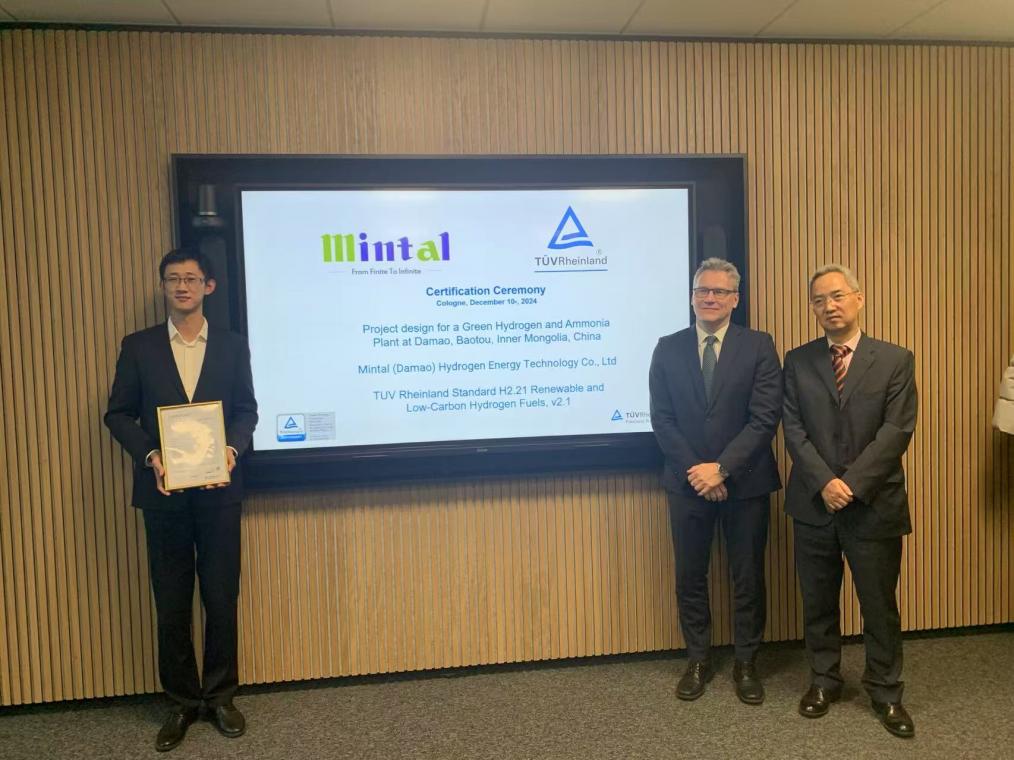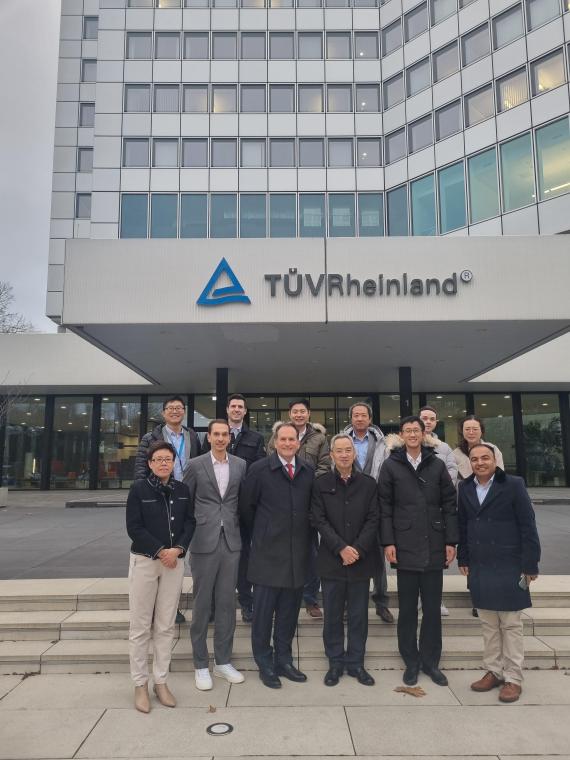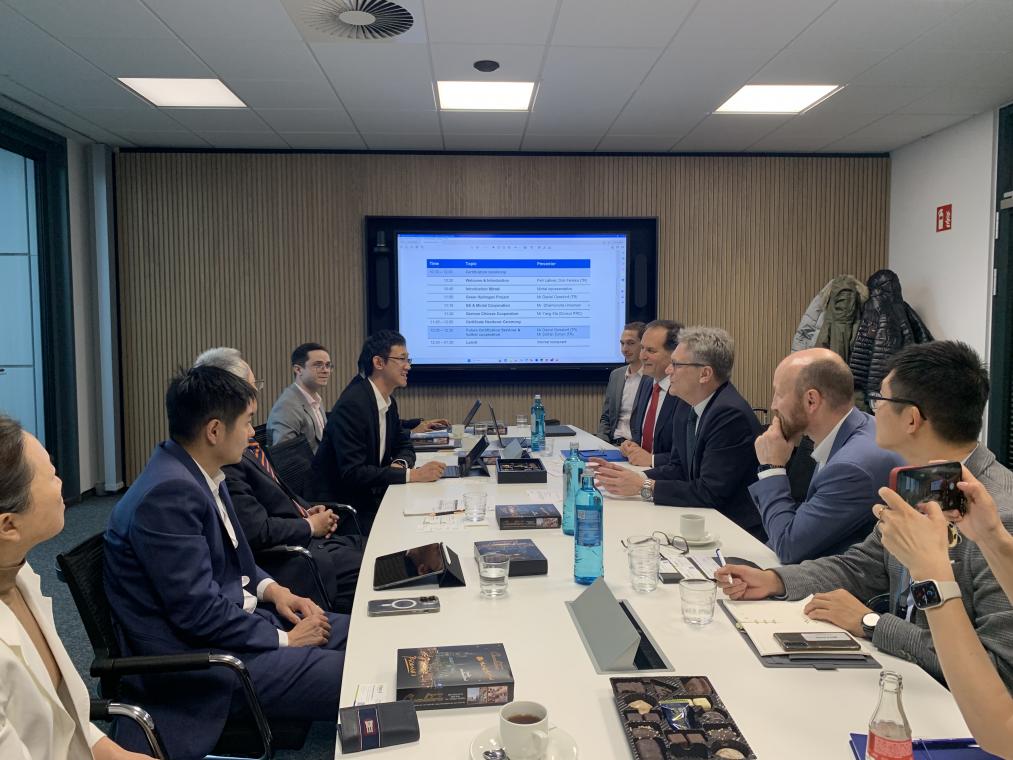Pre-Certification for Shuimu Mintal
Certification ceremony in Cologne: Successful pre-certification of Shuimu Mintal Damao project under the TÜV Rheinland H2.21 standard for renewable and low-carbon hydrogen fuels.
In October 2024, the Shuimu Mintal Damao project achieved a significant milestone as the first in China to receive a TÜV Rheinland pre-certification for green/renewable hydrogen and its derivative green/renewable ammonia (RFNBO), in compliance with the TÜV Rheinland H2.21 v2.1 standard, based on the EU Renewable Energy Directive III (RED III). This certification demonstrates that the project design complies with the requirements set forth in the EU Renewable Energy Directive for renewable fuels of non-biological origin (RFNBO).
On December 10th, a delegation from China met with TÜV Rheinland managers and colleagues involved with the project at the headquarters of TÜV Rheinland in Cologne for a certificate handover ceremony.
This accomplishment represents an important milestone in the renewable energy journey of TÜV Rheinland Greater China and Germany, laying a solid foundation for future international market expansion and fostering green cooperation between China and Europe.
1. Significance and Background of the Certification
The EU Renewable Energy Directive III (RED III) establishes stringent requirements for renewable energy products entering the European market. RFNBO certification not only requires a minimum 70% reduction in emissions compared to traditional fuels but also mandates strict compliance with the additionality, geographic, and temporal correlation criteria outlined in the delegated acts.
By obtaining the certification, TÜV Rheinland has demonstrated the efficiency of renewable energy utilization in hydrogen-based projects. Moreover, the ability to produce RFNBO at high volumes, even under fluctuating renewable energy conditions, underscores the capability of Shuimu Mintal to meet stringent EU standards, positioning them as a strong contender in the international market. This achievement sets a precedent for other Chinese enterprises seeking to expand into Europe and beyond.
2. Application of PHX Dynamic Technology in the Damao Project
The proprietary PHX Dynamic Technology of Shuimu Mintal played a pivotal role in project planning, addressing renewable energy intermittency, reducing grid dependence, and optimizing production costs.
Core Advantages of the PHX Technology:
Real-time energy load matching: Ensures maximum utilization of wind and solar power while minimizing curtailment.
Optimization of self-generated energy: Reduces grid dependence, increases energy efficiency, and lowers carbon emissions.
Conformity with RED III requirements: Adherence to the additionality, geographic, and temporal requirements of delegated acts CDR 1184 & 1185.
Significant carbon emission reduction: PHX technology improves energy utilization efficiency while minimizing emissions during green hydrogen and green ammonia production, achieving an optimal balance between sustainability and cost-effectiveness.
Thus, the successful application of the PHX technology has given the project a competitive edge, paving the way for large-scale deployment in the future.
3. The Critical Role of TÜV Rheinland
TÜV Rheinland, as a globally recognized third-party inspection and certification body, has been instrumental in the certification process. The transparent and professional approach has ensured the successful pre-certification of the green hydrogen and green ammonia plant design.
The key contributions of TÜV Rheinland:
Globally recognized certification: The thorough technical review and data validation ensured that the project’s design and data integrity adhered to the EU’s stringent standards.
Compliance with market entry requirements: The expertise in EU regulatory frameworks provided a robust foundation for the marketability of the customer’s products in Europe.
Enhancing global competitiveness: The certification affirms the green hydrogen and green ammonia products’ credibility of the customer on the international stage, strengthening the position of the hydrogen industry and TÜV Rheinland in the global energy market.
Receiving the certification of TÜV Rheinland for RFNBO under the H2.21 standard marks a significant step forward in the renewable energy sector. This milestone highlights the technological capability and sustainability commitment of Chinese enterprises in the global market, creating new opportunities for local economic growth and green transformation. Moving forward, TÜV Rheinland will continue to collaborate closely with governments and industry partners to advance China’s green energy ambitions.



